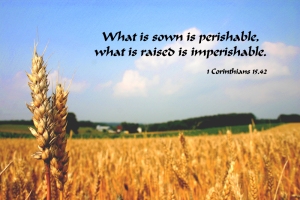
In this series, we are surveying some of the most important Reformed theological distinctions. These are not irrelevant or minor points of theology. Rather, these are distinctions where, if you get them wrong or ignore them, major theological disaster threatens to ensue. We need to strive for precision in our understanding of the teachings of God’s Word.
We’ll begin at the end. Our first theological distinction comes from the area of eschatology, the doctrine of the last things. This is an area where believers are easily confused. This is partly because the Bible does not give comprehensive details about the age to come. As a result, extra-biblical speculation is not in short supply. To be sure, it’s okay to speculate in some circumstances, but you should always identify such speculation and make it clear that it’s simply your opinion.
However, there are points on which we definitely need not speculate, because the Bible is abundantly clear. When we distinguish between intermediate state and the final state, we are in the realm of clear biblical teaching. Let me first define the terms and then I’ll briefly show how Scripture leads us to this distinction.
Defining the Terms
We are looking at the state of believers after this life. There is an intermediate state. “Intermediate” means that it’s the in-between state. It’s between this life on earth and our life in the new creation. The intermediate state is our existence in heaven after death. Immediately after we die, our souls go to be with God in heaven. We go to heaven in sinless moral perfection, but as incomplete human beings because we lack our bodies. In the intermediate state, we dwell in God’s presence as disembodied souls. This is not how we are to spend eternity. Because we are united to Christ, a true human being with a body and soul, our intermediate state is temporary. It is how we exist until the time of the resurrection.
When Christ returns, the bodies of almost all human beings who have ever lived will rise from the dead – the only exceptions are Christ himself, Enoch, and Elijah. Human souls will be reunited with human bodies and we will be complete again, the way we were created and designed to exist. In this state, the wicked will go to their eternal destruction, but the righteous (those in Christ) will go to their eternal blessedness. The final state for believers is our existence in the new creation after the resurrection, living in God’s presence forever as perfect, complete, and glorified human beings, body and soul.
Biblical Basis
But is it biblical to distinguish between the intermediate and final state? Concerning the intermediate state, we could think of Christ’s words to the thief on the cross in Luke 23:43, “Truly, I say to you, today you will be with me in Paradise.” The thief died. His body remained on earth, but he went to be with Christ in Paradise/heaven. His soul went to be with the Lord when he died. What is true of that man is true of all believers. But we learn from elsewhere in Scripture that this disembodied existence is not the final state for glorified believers. In 1 Corinthians 15, we learn how important the resurrection of the dead is for the gospel. Paul writes that our perishable bodies will put on the imperishable and mortal bodies will put on immortality (1 Cor. 15:53). The book of Revelation too describes an existence for believers before the resurrection (Rev. 6:9) and after the resurrection (Rev. 20:11-15), an intermediate state and a final state. Because it is so clearly taught in Scripture, there has been little theological debate about the distinction itself. Debates have raged about the details of both states, but concerning the distinction between the two, no one really demurs.
Since it’s biblical, it’s also found in the summary of biblical teaching in our Belgic Confession. Article 37 states, “Those who will have died before that time [the Day of the Lord] will arise out of the earth, as their spirits are once again united with their own bodies in which they lived.” Obviously, human spirits have been existing in a disembodied state between their death and the resurrection – an intermediate state. At the resurrection, there is a reunion of bodies and spirits – they enter into a final state, which for believers is “glory such as the heart of man could never conceive.”
Why It Matters
Yet even though it is so biblical, sometimes this distinction gets forgotten amongst Christians. There are consequences to confusing these things. When you mistakenly think that the intermediate state is the final state, you’re in danger of denying the future resurrection. When you think that existence as a disembodied soul is your eternal destiny as a believer, what do you do with those passages of Scripture that speak about a universal resurrection? You’re really back at the problem being addressed by Paul in 1 Corinthians 15. He argues that if you think that existence as a disembodied soul is all there is and ever will be after death, with no future resurrection in the picture, then you’ll potentially run into trouble with Christ’s resurrection. After all, Christ rose from the dead as the first fruits of the resurrection of believers. It all hangs together – deny one part and you deny the other.
Mucking up the intermediate/final distinction also has the unfortunate consequence of leading one to a mistaken understanding of the physical and spiritual. Many Christians seem to have this idea that the spiritual is truly good, and the physical is evil. We need to cast off our evil physical existence so that we can attain a pure and good spiritual existence. This is not biblical thinking. The intermediate/final distinction tells us that our ultimate future is a physical existence as complete human beings, body and soul, in a real, physical new creation. Physical matter is not evil in itself. Yes, the created order around us has been stained with sin and creation is groaning for redemption. But when God created it as physical matter, he created it all good! It was good at the beginning and it will all be good again at the end.
When believers die, they go to heaven. They are there rejoicing in the presence of God, but the manner in which they are there is only temporary. When Christ returns, believers will continue to be in blessed presence of God, but the manner in which they are will change. It will be far better, reflecting the glory of Christ as complete human beings. In other words, in the intermediate state, we are holy, but not yet whole. In the final state, we will be both whole and holy, forever. Sound theology makes us long for the day!



